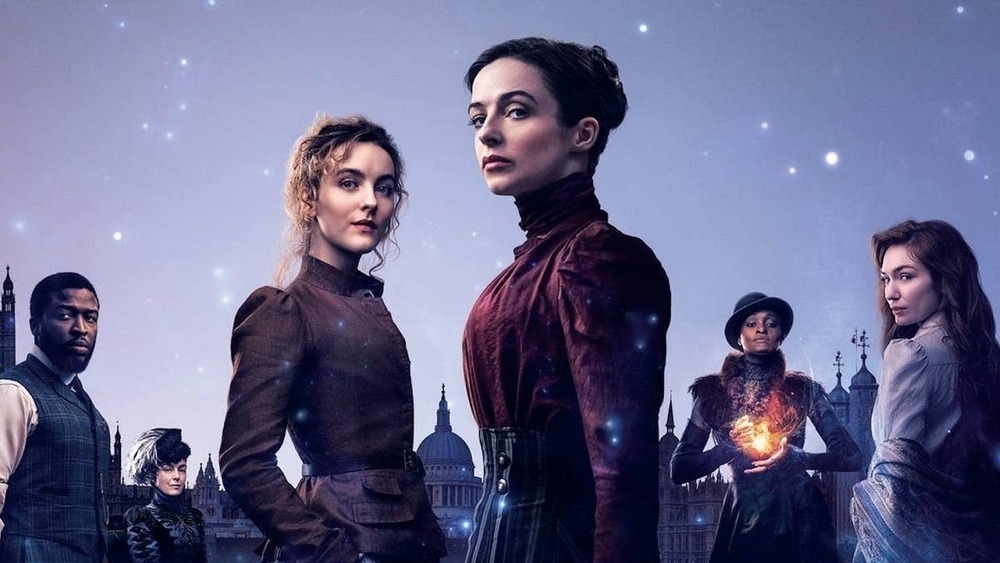This post contains slight spoilers for The Nevers.
I just watched the first episode of The Nevers. Yes, it was created, written, and directed by Joss Whedon. Yes, I am appalled and heartbroken by the way he treated his colleagues on Buffy, Angel, and Justice League. That’s about all I have the heart to say about it. I’d like to talk about The Nevers now which, of course, can’t be completely separated from him, but also kind of is its own thing. As Austin Kleon says, “Art Monsters are not necessary or glamorous and they are not to be condoned, pardoned, or emulated” (Keep Going, p. 124) but also “bad people can make good art.” I haven’t decided if The Nevers seems like good art to me, but I can’t deny that a lot of JW’s other art has been central to my life for the past almost 22 years. So. I want to talk about this art, acknowledging the bad behavior of its creator.
I’m going to talk about The Nevers now, like I said.
Over at The Ringer, Alison Herman describes the protagonists of The Nevers as “Victorian Lady X-Men,” and this is not wrong.
Specifically, you’ve got a bunch of persecuted superpowered people living in a facility sponsored by a rich person who used a wheelchair.
Let’s talk for a minute about Lavinia Bidlow (played by “I am very British. I don’t say Hard Rs” Olivia Williams). Lavinia Bidlow uses a wheelchair. As far as I can tell, she herself is not one of The Touched (aka superpowered people) and has no turn (aka superpower). But she is extremely devoted to making sure that The Touched have a home and are safe and thus she sponsors the “orphanage” where many of them live and work. (There are rogue Touched and unaffiliated Touched, too. Like… Like mutants. In X-Men.)
So. Lavinia Bidlow, using a wheelchair presumably due to a disability, feels a great deal of sympathy and/or empathy for The Touched.
People often refer to The Touched as “afflicted.”
Mrs. Amalia True, head rounder-upper of Touched-who-need-protection, precog lady (not to be confused with Doyle/Cordelia’s power on Angel, which IIRC was more clairvoyance than precognition but usually conveniently early clairvoyance that often allowed time to save the person they saw) and skilled fighter, responds to Ominous Fancyman Lord Massen in this conversation:
Massen: I take it then that you are yourselves among the afflicted.
True: Touched, yes. We don’t consider ourselves afflicted.
Massen: Perhaps some women are more fortunate in the nature of their ailment than others.
True: That’s true, but more suffer from society’s perception than their own debilitation.
This set off little bells in my head, as it sounds very much to me like a TV superhero’s quick explanation of the social model of disability. From that moment I started watching this as if it were a supremely unsubtle metaphor for disability. I’m not sure if it works, but I do find it an interesting lens.
There’s also Maladie, who is the most prominent rogue Touched, is a serial killer, and certainly appears to live with a mental illness. (It is a perfectly valid criticism when Natalie Zutter at Tor.com says her dialogue “feels like it was collected from Drusilla’s cutting-room-floor musings.”) We see Maladie about to be carted off to an asylum in the flashbacks to the day when the Touched got their powers. And of course, “touched” has been used as a rather unkind euphemism for having mental illness.
I have invisible disabilities including autoimmune disease that is sometimes debilitating, migraines, depression, and anxiety. Lord Massen would call me more fortunate and there are certainly many forms of ableism I don’t face. But when I struggle to work through a migraine or have trouble going downstairs to the kitchen from my bedroom because all of my joints hurt, I wonder if there is a place in this world for me. So near the end of the episode, when strawberry-blonde Irish science nerd Penance Adair (your Willow/Kaylee stand-in and thus my fave) describes a feeling “that I’m here. I belong here… all of us that’s Touched, we’re woven into the fabric of the world and we’re meant to be as we are,” my heart swells and I think, “YES, I want to feel that way!” (I do, sometimes, but I want to feel it more.)
Does this all add up to a solid disability metaphor? Not yet, and it’s very possible what we’ll see here is a kind of “fantastic ableism” akin to the fantastic racism X-Men and other stories are critiqued for. But I’m watching with this lens now and I’m interested to see what I find.
I haven’t found anybody else approaching The Nevers this way, but if you have, I’d love to hear about it! I’d especially love a perspective from someone with more visible disabilities.
